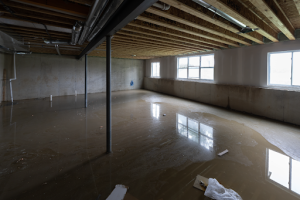Summary: You may need a sump pump if your basement has flooded before, feels damp or musty, has foundation cracks, or is located in an area with heavy rainfall or a high water table. A sump pump helps prevent basement flooding by automatically removing groundwater before it causes water damage, mold growth, or structural issues.
Spring is here, and while it ushers in warmer weather and blooming flowers, it also brings heavy rains, melting snow, and an increased risk of crawl space and basement flooding. Homeowners dread the added moisture; they know just a few inches of water can cause thousands of dollars in home flood damage, leading to structural issues, ruined furniture and belongings, and even dangerous mold growth. If your basement is at risk, now is the time to consider a sump pump installation.
Related: 8 Ways to Prevent a Plumbing Emergency During Your Holiday Vacation
How Do Sump Pumps Work?
A sump pump is a device designed to prevent crawl space or basement flooding. It removes water from a hole in the floor (called a basin or pit) that collects water when it’s seeping in. When groundwater levels rise due to heavy rain, melting snow, drainage, or seepage, a float switch or pressure sensor detects the higher water level and the sump pump automatically activates, pumping water away from your home’s foundation and into a designated drainage area. This keeps your basement dry and protects your home from costly water damage.
There are two main types of sump pumps:
- Submersible Pumps: Installed inside the sump pit, these are quieter and can save space, even though they do require a larger pit than their counterpart. Another benefit is that the water in the pit helps to keep the motor cool when it’s working harder than usual, which keeps it from overheating during heavy rainfall events. This type of pump also deftly handles larger debris and solids because it is more powerful than the other type.
- Pedestal Pumps: If the pit is narrow or shallow, a pedestal pump can more easily fit the space. These pumps sit above the sump basin, making maintenance easier but producing more noise.
Both types are effective at flood prevention, and choosing the right one depends on your basement layout and water table levels. We can help you decide which is best for your home.
Do You Need a Sump Pump?
If you live in an area prone to heavy rainfall, have a high water table, or have experienced basement flooding in the past, a sump pump is a wise investment. Here are some signs you might need one:
- Your basement has flooded before, even slightly.
- Your area experiences frequent heavy rains or rapid snowmelt.
- You have a damp or musty-smelling basement, indicating excess moisture.
- Your basement windows are leaky.
- There are wall and floor cracks that cause leaks.
- Your walls and floors have efflorescence, a powdery deposit of salts.
- You have valuable items stored in your basement that you want to protect.
The Benefits of a Sump Pump
A properly installed sump pump offers homeowners peace of mind and several key advantages:
- Prevents Flood Damage: A sump pump protects your home’s foundation, walls, and belongings from water damage.
- Reduces Mold and Mildew: A sump pump keeps moisture levels low, preventing dangerous mold growth.
- Increases Property Value: A dry basement is a huge selling point for potential buyers.
- Protects Against Sewer Backups: Some sump pumps can help to prevent sewage from backing up into your home during heavy storms.
What If Your Sump Pump Stops Working?
Like any home system, sump pumps require occasional maintenance and may need repair over time. If you notice unusual noises, failure to activate, or continuous running, it may be time for sump pump repair or inspection. Regular maintenance, including cleaning the pump, checking the power source, and testing it before the rainy season, can ensure it functions when really needed.
Additionally, you can consider adding a battery back-up sump pump to your space. Since many storms also knock out the power, this is a smart investment. It will activate once the power fails, the pump fails, or the water level is too high for the primary pump to handle, and provide the same pumping capabilities as the primary pump.
Related: 8 Signs Your Sump Pump Is on the Fritz
We Can Help With Sump Pump Installation and Repair
If you’re unsure whether you need a sump pump (or if your current pump is working correctly), we can help. Our experts specialize in sump pump installation and sump pump repair, ensuring that your home stays protected from flooding this season and beyond. An ounce of prevention is worth a pound of cure when it comes to flood risk. Don’t wait until water damage becomes a costly problem – contact our expert team at Superior HVAC & Plumbing today to safeguard your home. You can enjoy all of the beauty a wet spring brings without having to worry about the trouble it can bring too!

